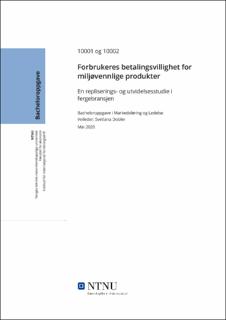| dc.contributor.advisor | Dobler, Svetlana | |
| dc.contributor.author | Hagen, Maren Fjelldal | |
| dc.contributor.author | Lund, Emma Adele Larsen | |
| dc.date.accessioned | 2020-07-14T16:05:37Z | |
| dc.date.available | 2020-07-14T16:05:37Z | |
| dc.date.issued | 2020 | |
| dc.identifier.uri | https://hdl.handle.net/11250/2664164 | |
| dc.description.abstract | Formålet med denne studien er å undersøke forbrukeres betalingsvillighet for miljøvennlige og bærekraftige produkter. Studien til González-Rodríguez, Díaz-Fernández og Font (2019), som tester miljøeffekter på betalingsvillighet i hotellbransjen ved bruk av sosial identitetsteori (SIT) og verdi-tro-norm teori (VBN), repliseres i en ny reiselivssetting - fergebransjen. I tillegg til å replisere studien til González-Rodríguez, Díaz-Fernández og Font (2019), utvider vi deres modell med to begreper fra teorien om planlagt atferd (TPB) (Ajzen, 1991).
Dataene ble samlet inn gjennom en online-undersøkelse av 240 respondenter, og modellen ble testet ved bruk av Structural Equation Modeling (SEM)-verktøyet SmartPLS. I vår studie får vi empirisk støtte for 7 av 9 hypoteser. Funnene i denne studien er ganske like som i repliseringsstudien (González-Rodríguez, Díaz-Fernández og Font, 2019) ved at produktets miljøpraksis og forbrukernes miljøbekymring begge har signifikante effekter på forbrukeres betalingsvillighet, samt at produktets miljøpraksis har en signifikant påvirkning på produktets miljøomdømme. Videre finner vi også støtte for hypoteser generert fra TPB, dvs. at forbrukernes holdninger til miljø har en signifikant påvirkning på forbrukernes betalingsvillighet, samt at forbrukernes kunnskap om miljø har en signifikant effekt på forbrukernes holdning til miljø. I tillegg finner vi en statistisk sammenheng mellom forbrukernes miljøbekymring og forbrukernes kunnskaper om miljø, noe som knytter teoriene, SIT, VBN og TPB, teoretisk og empirisk sammen. Vår fulle modell (replisering og utvidelse) forklarer 40% av den avhengige variabelen betalingsvillighet.
Den empiriske analysen støtter det teoretiske argumentet om at sosial identitetsteori (SIT), verdi-norm-tro teorien (VBN) og teorien om planlagt atferd (TPB) er å betrakte som komplementære teorier for å forklare forbrukeres betalingsvillighet for bærekraftige produkter. Studiens øvrige bidrag er at den 1) repliserer tidligere funn i en ny empirisk setting, og 2) den identifiserer og får empirisk støtte for sentrale teoretiske faktorer som påvirker forbrukernes vilje til å betale en ekstra pris for miljøvennlige produkter generelt, og for fergebransjen spesielt. | |
| dc.description.abstract | The purpose of this study is to investigate consumers´ willingness to pay for environmentally friendly and sustainable products. The study of González-Rodríguez, Díaz-Fernández and Font (2019), which tests environmental impacts on willingness to pay in the hotel industry using social identity theory (SIT) and value-belief-norm theory (VBN), is replicated in a new tourism setting – the ferry industry. In addition to replicating the study of González-Rodríguez, Díaz-Fernández and Font 2019 (2019), we extend their model to concepts from the theory of planned behavior (TPB) (Ajzen, 1991).
The data was collected through an online survey of 240 consumers, and models were tested using the Structural Equation Modeling (SEM) tool, SmartPLS. In our study we get empirical support for 7 of 9 hypotheses. The findings in this study are very similar to the replication study González-Rodríguez, Díaz-Fernández og Font (2019) where the products´ environmental practices and consumer environmental concern both have significant effect on consumers´ willingness to pay. The products´ environmental practices have a significant impact on the products´ environmental image. We also find support for hypotheses generated from TPB, i.e. consumers attitudes towards the environment have a significant impact on consumers´ willingness to pay, as well as consumers´ knowledge of the environment has a significant effect on consumers´ attitudes towards the environment. In addition, we find statistical correlation between consumers´ environmental concern and consumer knowledge of the environment, which links the theories SIT, VBN and TPB together, both theoretically and empirically. Our full model (replication and expansion) explains 40% of the dependent variable; willingness to pay.
The empirical analysis supports the theoretical argument that, social identity theory (SIT), value-belief-norm theory (VBN) and theory of planned behavior (TPB) is to be regarded as complementary theories to explain consumers´ willingness to pay for sustainable products. The study´s contributions is that it 1) replicates previous findings in a new empirical setting, and 2) it identifies and receives empirical support for the key theoretical factors that influences consumers´ willingness to pay for environmentally friendly products, and in particular for the ferry industry. | |
| dc.publisher | NTNU | |
| dc.title | Forbrukeres betalingsvillighet for miljøvennlige produkter - en repliserings- og utvidelsesstudie i fergebransjen | |
| dc.type | Bachelor thesis | |
